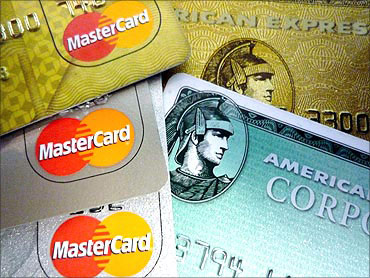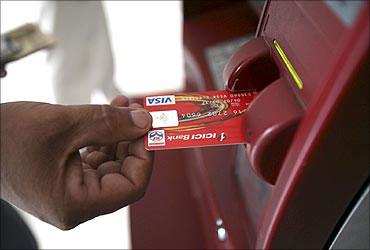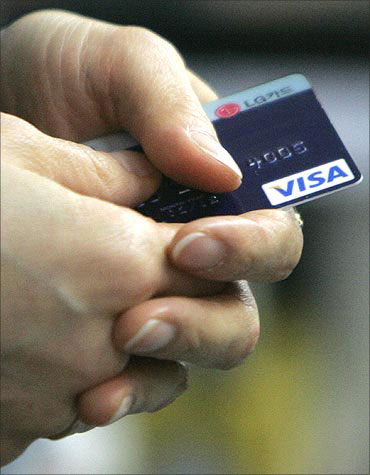 | « Back to article | Print this article |
11 credit card fees that you must know about
Credit card companies lure customers into buying a credit card by offering it free of cost.
Customers, many a time believe that if there is not cost involved in buying it, why not have it? So even if I have a card(s) sufficient to take care of my needs, I will opt for another one just because there is not cost associated to it.
Here you stand corrected.
There are various charges that come with a credit card usage let on alone the annual charges.
Joining and annual fee: In order to entice customers into buying a credit card, many credit card companies offer credit cards free of cost, i.e. no joining fees and perhaps exemption from annual fee for a particular period, say, 1 year after which they will start charging an annual fee.
The joining and annual fee could range from Rs 1,000 to Rs 3,000 depending on the type of card.
Duplicate Statement fee: While monthly statements are delivered free of cost to the address of the card holder, request for a duplicate statement in the physical form attracts charges which is typically a fixed sum.
Some credit card issuers also charge for a duplicate e-statement. E.g. Rs 100 for a bill over 3 months.
Click NEXT to read on
The author is CEO, BankBazaar.com
11 credit card fees that you must know about
Interest/finance costs: This is a charge well know among credit card users. It is primarily the interest rate levied by the credit card company on the outstanding amount if it is not repaid before the expiry of the due date.
This charge can range anywhere between 2.5 per cent and 4 per cent per month which in annualized percentage rate (APR) turns out to be as high as 30-48 per cent.
Late payment charges: Every time you make a late payment, over and above the interest rate charged, credit card companies will charge a late payment fee which can either be a fixed sum or a certain percentage of the minimum outstanding balance with a minimum and maximum threshold. It varies from one credit card company to another.
For example, late payment charges could be 30 per cent of the minimum outstanding amount subject to a minimum of Rs 300 and a maximum of Rs 600.
Cash withdrawal: Cash withdrawal is withdrawing money from the bank against your credit limit. Credit card companies charge individuals for cash withdrawal on the credit card.
The charges could be a certain percentage of the transaction value or a fixed sum. For instance, 2.5 per cent of the transaction value subject to a minimum of Rs 250.
Click NEXT to read on
11 credit card fees that you must know about
Overdraft Limit: Credit card companies charge an overdrawn fee if the customer exceeds his credit limit. This fee is normally a certain percentage of the overdrawn amount subject to minimum and maximum amount.
For example, 5 per cent of the overdrawn limit subject to a minimum of Rs 300 and a maximum of Rs 600.
Outstation cheque fee: For the purpose of payment, if you have issued an outstation cheque, the credit card issuer will charge you a fee for it which is a certain percent of the cheque value subject to a minimum amount. For example, 1 per cent of the cheque amount subject to a minimum of Rs 100.
Cheque Return/ ECS return charge: In case of a cheque bounce or a failure of ECS, a fixed amount is charged by the credit card issuer.
Foreign currency transactions: In case of transactions outside the country, the same is converted into Indian rupee at a rate suggested by the network infrastructure provider (Visa/Master). Credit card issuers charge a certain percentage of the transaction value subject to a minimum amount. For instance, 3.5 per cent of the transaction subject to a minimum of Rs 250.
Petrol transaction and railway ticket purchase fee: Petrol transaction is levied as a particular percentage of the transaction value subject to a minimum amount. For example, 2.5 per cent of transaction value subject to a minimum of Rs 10. In case of railway ticket purchase too, a charge is levied, which is a particular percentage of the transaction value, subject to a minimum amount. For instance, 2.5 per cent of the transaction amount subject to a minimum of Rs 30.
Service Tax: Expenses on the credit card are subject to service tax of 10.3 per cent which is levied on the total value of the transaction inclusive of fees, interest and other charges.
At the time of issue of credit card, the issuer needs to provide a document containing the terms and conditions governing credit card operations.
Before signing the agreement, make sure you go through the fine print with respect to all the possible charges that can be levied so that you understand the carefulness and caution with which you should use the card.
Powered by
BankBazaar.com is an online marketplace where you can instantly get loan rate quotes, compare and apply online for your personal loan, home loan and credit card needs from India's leading banks and NBFCs.
Copyright 2025 www.BankBazaar.com. All rights reserved.


